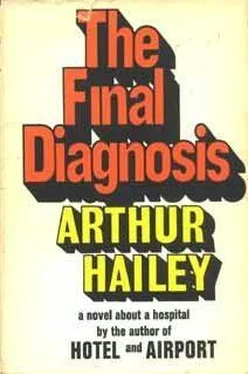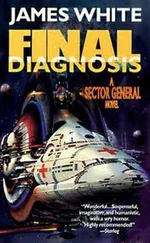Arthur Hailey - The Final Diagnosis
Здесь есть возможность читать онлайн «Arthur Hailey - The Final Diagnosis» весь текст электронной книги совершенно бесплатно (целиком полную версию без сокращений). В некоторых случаях можно слушать аудио, скачать через торрент в формате fb2 и присутствует краткое содержание. Жанр: Триллер, на английском языке. Описание произведения, (предисловие) а так же отзывы посетителей доступны на портале библиотеки ЛибКат.
- Название:The Final Diagnosis
- Автор:
- Жанр:
- Год:неизвестен
- ISBN:нет данных
- Рейтинг книги:4 / 5. Голосов: 1
-
Избранное:Добавить в избранное
- Отзывы:
-
Ваша оценка:
- 80
- 1
- 2
- 3
- 4
- 5
The Final Diagnosis: краткое содержание, описание и аннотация
Предлагаем к чтению аннотацию, описание, краткое содержание или предисловие (зависит от того, что написал сам автор книги «The Final Diagnosis»). Если вы не нашли необходимую информацию о книге — напишите в комментариях, мы постараемся отыскать её.
The Final Diagnosis — читать онлайн бесплатно полную книгу (весь текст) целиком
Ниже представлен текст книги, разбитый по страницам. Система сохранения места последней прочитанной страницы, позволяет с удобством читать онлайн бесплатно книгу «The Final Diagnosis», без необходимости каждый раз заново искать на чём Вы остановились. Поставьте закладку, и сможете в любой момент перейти на страницу, на которой закончили чтение.
Интервал:
Закладка:
They moved to the long table, some of the senior staff members going automatically to the front rectangle of chairs, the others dropping into the row behind. Lucy herself was in front. O’Donnell was at the head of the table, Pearson and his papers on the left. While the others were settling down she saw Pearson take another bite from his sandwich. He made no effort to be surreptitious about it.
Lower down the table she noticed Charlie Dornberger, one of Three Counties’ obstetricians. He was going through the careful process of filling his pipe. Whenever Lucy saw Dr. Dornberger he seemed to be either filling, cleaning, or lighting a pipe; he seldom seemed to smoke it. Next to Dornberger was Gil Bartlett and, opposite, Ding Dong Bell from Radiology and John McEwan. McEwan must be interested in a case today; the ear, nose, and throat specialist did not normally attend surgical-mortality meetings.
“Good afternoon, gentlemen.” As O’Donnell looked down the table the remaining conversations died. He glanced at his notes. “First case. Samuel Lobitz, white male, age fifty-three. Dr. Bartlett.”
Gil Bartlett, impeccably dressed as ever, opened a ring notebook. Instinctively Lucy watched the trim beard, waiting for it to move. Almost at once it began bobbing up and down. Bartlett began quietly, “The patient was referred to me on May 12.”
“A little louder, Gil.” The request came from down the table.
Bartlett raised his voice. “I’ll try. But maybe you’d better see McEwan afterward.” A laugh ran round the group in which the e.n.t. man joined.
Lucy envied those who could be at ease in this meeting. She never was, particularly when a case of her own was being discussed. It was an ordeal for anyone to describe their diagnosis and treatment of a patient who had died, then have others give their opinion, and finally the pathologist report his findings from the autopsy. And Joe Pearson never spared anyone.
There were honest mistakes that anybody in medicine could make—even, sometimes, mistakes which cost patients their lives. Few physicians could escape errors like this in the course of their careers. The important thing was to learn from them and not to make the same mistake again. That was why mortality conferences were held—so that everyone who attended could learn at the same time.
Occasionally the mistakes were not excusable, and you could always sense when something like that came up at a monthly meeting. There was an uncomfortable silence and an avoidance of eyes. There was seldom open criticism; for one thing, it was unnecessary, and for another, you never knew when you yourself might be subject to it.
Lucy recalled one incident which had concerned a distinguished surgeon at another hospital where she had been on staff. The surgeon was operating for suspected cancer in the intestinal tract. When he reached the affected area he had decided the cancer was inoperable and, instead of attempting to remove it, had looped the intestine to bypass it. Three days later the patient had died and was autopsied. The autopsy showed there had, in fact, been no cancer at all. What had really happened was that the patient’s appendix had ruptured and had formed an abscess. The surgeon had failed to recognize this and thereby condemned the man to death. Lucy remembered the horrified hush in which the pathologist’s report had been received.
In an instance like this, of course, nothing ever came out publicly. It was a moment for the ranks of medicine to close. But in a good hospital it was not the end. At Three Counties nowadays O’Donnell would always talk privately with an offender and, if it were a bad case, the individual concerned would be watched closely for a while afterward. Lucy had never had to face one of these sessions herself, but she had heard the chief of surgery could be extremely rough behind closed doors.
Gil Bartlett was continuing. “The case was referred to me by Dr. Cymbalist.” Lucy knew that Cymbalist was a general practitioner, though not on Three Counties’ staff. She herself had had cases referred from him.
“I was called at my home,” Bartlett said, “and Dr. Cymbalist told me he suspected a perforated ulcer. The symptoms he described tallied with this diagnosis. By then the patient was on the way to the hospital by ambulance. I called the surgical resident on duty and notified him the case would be coming in.”
Bartlett looked over his notes. “I saw the patient myself approximately half an hour later. He had severe upper abdominal pain and was in shock. Blood pressure was seventy over forty. He was ashen gray and in a cold sweat. I ordered a transfusion to combat shock and also morphine. Physically the abdomen was rigid, and there was rebound tenderness.”
Bill Rufus asked, “Did you have a chest film made?”
“No. It seemed to me the patient was too sick to go to X-ray. I agreed with the original diagnosis of a perforated ulcer and decided to operate immediately.”
“No doubts at all, eh, Doctor?” This time the interjection was Pearson’s. Previously the pathologist had been looking down at his papers. Now he turned directly to face Bartlett.
For a moment Bartlett hesitated and Lucy thought: Something is wrong; the diagnosis was in error and Joe Pearson is waiting to spring the trap. Then she remembered that whatever Pearson knew Bartlett knew also by this time, so it would be no surprise to him. In any case Bartlett had probably attended the autopsy. Most conscientious surgeons did when a patient died. But after the momentary pause the younger man went on urbanely.
“One always has doubts in these emergency cases, Dr. Pearson. But I decided all the symptoms justified immediate exploratory surgery.” Bartlett paused. “However, there was no perforated ulcer present, and the patient was returned to the ward. I called Dr. Toynbee for consultation, but before he could arrive the patient died.”
Gil Bartlett closed his ring binder and surveyed the table. So the diagnosis had been wrong, and despite Bartlett’s outwardly calm appearance Lucy knew that inside he was probably suffering the torments of self-criticism. On the basis of the symptoms, though, it could certainly be argued that he was justified in operating.
Now O’Donnell was calling on Joe Pearson. He inquired politely, “Would you give us the autopsy findings, please?” Lucy reflected that the head of surgery undoubtedly knew what was coming. Automatically the heads of departments saw autopsy reports affecting their own staff.
Pearson shuffled his papers, then selected one. His gaze shot around the table. “As Dr. Bartlett told you, there was no perforated ulcer. In fact, the abdomen was entirely normal.” He paused, as if for dramatic effect, then went on. “What was present, in the chest, was early development of pneumonia. No doubt there was severe pleuritic pain coming from that.”
So that was it. Lucy ran her mind over what had been said before. It was true—externally the two sets of symptoms would be identical.
O’Donnell was asking, “Is there any discussion?”
There was an uneasy pause. A mistake had been made, and yet it was not a wanton mistake. Most of those in the room were uncomfortably aware the same thing might have happened to themselves. It was Bill Rufus who spoke out. “With the symptoms described, I would say exploratory surgery was justified.”
Pearson was waiting for this. He started ruminatively. “Well, I don’t know.” Then almost casually, like tossing a grenade without warning: “We’re all aware that Dr. Bartlett rarely sees beyond the abdomen.” Then in the stunned silence he asked Bartlett directly, “Did you examine the chest at all?”
The remark and the question were outrageous. Even if Bartlett were to be reprimanded, it should come from O’Donnell, not Pearson, and be done in private. It was not as if Bartlett had a reputation for carelessness. Those who had worked with him knew that he was thorough and, if anything, inclined to be ultra-cautious. In this instance, obviously, he had been faced with the need to make a fast decision.
Читать дальшеИнтервал:
Закладка:
Похожие книги на «The Final Diagnosis»
Представляем Вашему вниманию похожие книги на «The Final Diagnosis» списком для выбора. Мы отобрали схожую по названию и смыслу литературу в надежде предоставить читателям больше вариантов отыскать новые, интересные, ещё непрочитанные произведения.
Обсуждение, отзывы о книге «The Final Diagnosis» и просто собственные мнения читателей. Оставьте ваши комментарии, напишите, что Вы думаете о произведении, его смысле или главных героях. Укажите что конкретно понравилось, а что нет, и почему Вы так считаете.












